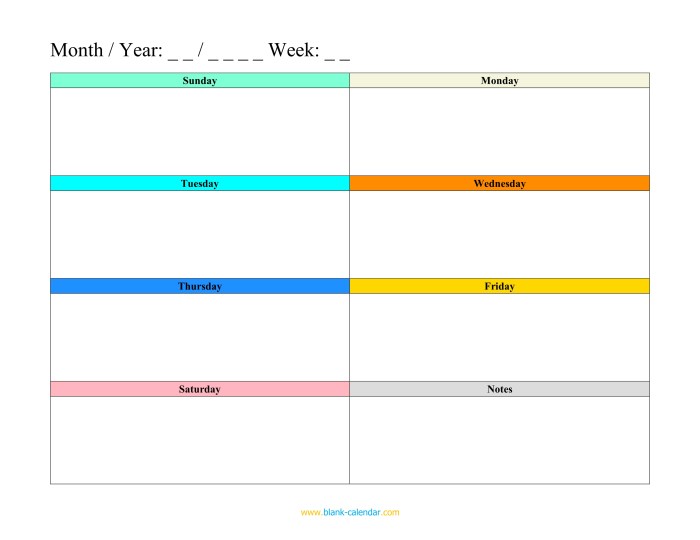Weekly Schedule Planner Your Productivity Power-Up
Stop feeling overwhelmed by your to-dos. A well-designed weekly schedule planner is your secret weapon for maximizing productivity and minimizing stress. Whether you’re a student, professional, or parent, a customized schedule can help you conquer your week and achieve your goals.
This guide dives deep into the world of weekly schedule planners, exploring different types, features, and tools. We’ll cover everything from digital calendars to physical planners, helping you choose the perfect method for your needs and lifestyle. Learn how to create a schedule that works for *you* and not the other way around.
Defining Weekly Schedule Planners
Weekly schedule planners are essential tools for managing time effectively and achieving goals. They come in various formats, each with its own strengths and weaknesses. Understanding these differences helps you choose the best planner for your needs and lifestyle.
Types of Weekly Schedule Planners
Weekly schedule planners can be categorized into three main types: digital, physical, and hybrid.
Digital Planners: These planners utilize software or apps on computers, tablets, or smartphones. They offer flexibility, accessibility, and often seamless integration with other digital tools. Key features include task creation, reminders, calendar integration, and data backup.
Physical Planners: These planners take the form of notebooks, journals, or dedicated weekly schedule templates. They offer a tangible way to visualize schedules and tasks, often with a sense of personal connection and tactility. Key features include space for daily and weekly entries, potential for creativity, and reduced screen time.
Hybrid Planners: These planners combine elements of both digital and physical formats. They often involve a physical planner with accompanying digital tools for tasks and reminders, offering a blend of flexibility and tactile experience.
Planning Styles
Different planning styles cater to various approaches to task management.
To-do Lists: A simple, straightforward way to jot down tasks, prioritizing them for completion. Often used in conjunction with other planning styles.
Calendars: Excellent for scheduling appointments and events, allowing for visual overview of the week’s commitments.
Time Blocking: Allocating specific time slots for tasks, encouraging focused work and better time management.
Advantages and Disadvantages
Each type of planner comes with its own set of advantages and disadvantages.
Digital Planners: Advantages include accessibility, flexibility, and data backup. Disadvantages may include reliance on technology and potential for distractions.
Physical Planners: Advantages include a sense of tangibility and reduced screen time. Disadvantages may include the need for physical space and potential for loss or damage.
Hybrid Planners: Advantages include combining the benefits of both digital and physical planners. Disadvantages may include the complexity of managing both aspects.
Digital vs. Physical Planners
| Feature | Digital | Physical |
|---|---|---|
| Ease of Use | Often intuitive, especially for tech-savvy users. | Can be intuitive, but depends on the user’s preference. |
| Cost | Can range from free to expensive, depending on the app or software. | Can vary in cost, from basic notebooks to elaborate planners. |
| Portability | Highly portable, accessible from various devices. | Portability depends on the size and type of planner. |
| Customization Options | Generally offer extensive customization. | Customization options are limited, but can be enhanced by using pens, markers, and stickers. |
Benefits and Use Cases
Weekly schedule planners offer numerous benefits for personal productivity, enhancing time management and task organization.
Benefits and Use Cases
Using a weekly schedule planner enhances personal productivity by providing a structured framework for managing tasks, prioritizing commitments, and achieving goals. It’s crucial for efficient time management.
Students: Planners help manage assignments, study sessions, and extracurricular activities.
Professionals: Planners aid in scheduling meetings, projects, and deadlines, boosting efficiency.
Parents: Planners assist in balancing work, family commitments, and personal time.
Specific Use Cases
| Profession | Benefits | Specific Planner Features |
|---|---|---|
| Project Manager | Improved project scheduling and task delegation. | Time blocking, task prioritization, collaboration features. |
| Sales Representative | Organized scheduling of appointments and client interactions. | Calendar integration, reminders for follow-ups. |
| Teacher | Effective lesson planning and management of student activities. | Class schedule integration, assignment deadlines, student progress tracking. |
Features and Design Elements

Effective weekly schedule planners include essential features that enhance user experience and promote productivity.
Essential Features
Essential features include visual clarity, intuitive design, and customization options.
Visual Clarity: Clear layout and use of color-coding enhance comprehension.
Intuitive Design: Easy navigation and user-friendly interface.
Customization Options: Personalization through color-coding, task categorization, and layout preferences.
Layout Options
| Layout | User Preferences | Task Management Approach |
|---|---|---|
| Weekly Grid | Visual overview of the entire week. | Suitable for managing multiple tasks and deadlines. |
| Daily Log | Detailed focus on daily activities. | Effective for tasks with specific time requirements. |



